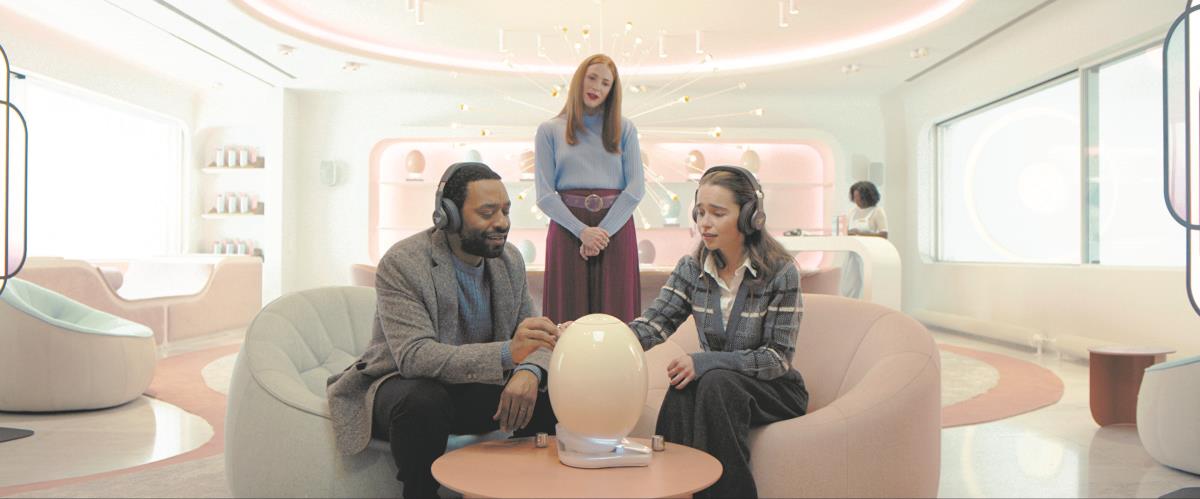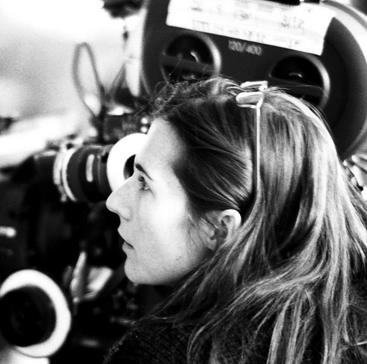[Interviewee - Sophie BARTHES (Director) / interviewer - KANG Minyoung (Writer)]

Q1. Were your personal experiences helpful while working on The Pod Generation? What was the starting point of the idea for the film?
The film was inspired by many dreams I had during my pregnancy. In my first feature film “Cold Souls”, New Yorkers could extract and store their souls. I also made a short film called “Happiness”, in which a factory worker purchases a box of happiness. Unable to bring herself to open the box, she returns it and continues her monotonous life. With The Pod Generation, I decided to pursue the thematic exploration of the commodification of the unthinkable… namely the Womb. I think living in the US makes you feel at times that everything can become a commodity. I also feel the society has dangerously become infatuated with technology and there is very little regulation. Just look at what is happening right now with TikTok, Instagram, etc… and the Congress inability to regulate. The same thing will happen with AI. It’s a society madly in love with technology and its inventions but we are re-enacting the myth of the Pandora Box. Technology should remain a tool, but it feels more an more that we are becoming slaves to these tool.
Q2. After watching the film, I was most impressed by the production design. I know you wrote the screenplay yourself, so what did you consider the most important in designing the world of The Pod Generation?
The idea was to make the technology very seductive and appealing. (soft colors, round shapes, desirable design). I think in the future, tech design will blur the line between the organic and the digital and create an era of confusion, in which we are not sure what is organic and what is technological, and become almost an extension of ourselves. It was important that the technology looked very beautiful and playful so we are attracted to it. It’s almost a fetish. The Pod (the artificial wombs) is an allegory. We can project what we want on this Pod. There is a baby inside, but for me again it’s a sort of Pandora Box. I have to mention the beautiful work our Production Designer Clement Price-Thomas did on this film. He is an aesthete and created a gorgeous futuristic world.
Q3. The “pod” reminded of Tamagotchi, a Japanese electronic pet from about 25 years ago that some people still enjoy, and BBs from the game Death Stranding. People have been imagining artificial wombs in various shapes for a long time now, and I wonder if you paid particular attention when designing the “pod”?
Yes we put a lot of thoughts in designing the Pod, thinking about its functionality and also credibility. The entire film is based on “suspension of disbelief” so we hope the audience comes along the ride and believes there is a baby in the Pod! I think one of the designer had worked on designing luxury car hoods… and I thought this was ironic and prefect: the Pod should feels like a precious, luxurious and every day item. For me this is how absurd the human condition is becoming: we rely more on objects, on trade, on accumulation of material goods than other values…. I think your Tamagotchi reference is spot on! There is an element of fetish in the Pod. And of course we wanted to infuse some comedy and humor too….
Q4. In The Pod Generation, there is a brief scene about the anti-pod movement. Overall, the movement seems to be a plausible one, but the scene sticks out in the film, and I’m curious as to whether you’ve put your personal opinion or viewpoint into this scene.
I wanted to show that in any society there is always the counter-point, the counter-culture. What is surprising in America today is the polarization of the society. You cannot ignore it. For every idea, there is its radical opposite and even the radicals do not agree between themselves. Ultimately, I think that it’s healthy that a democratic society is fragmented in different point of views, what is less healthy is that there is no room for a real intellectual debate today in the US, it’s all mostly “opinions” (“Doxa” as the Greeks would say, in contrast with “Episteme”, knowledge). So for instance, I was surprised to see that in the US the femisnist movement is itself so fragmented and you could imagine some radical feminist being “pro-pod” to liberate women from the burden of motherhood, while other radical feminist would be “anti-pod” as it takes away the power of giving birth from women… I cannot tell you my personal opinion in a few sentences, I made a film for that!
Q5. Do you have any behind-the-scenes stories about casting Emilia Clarke and Chiwetel Ejiofor?
I was so lucky Emilia Clarke loved the script and immediately jumped on board. She also came on board as an Executive Producer to make sure the film would be made. Without her, I think the film would have not seen the light. She was extremely supportive. I have always admired Chiwetel Ejiofor’s work and was overwhelmed with joy when he accepted the role. Our respective agency CAA has been instrumental in making sure I could cast this film and get it made.
Q6. The nature versus artificial intelligence conflict is popular in the general science fiction genre and is widely used, and I think The Pod Generation faithfully follows the grammar of the science fiction genre in this trend. Please tell us if you have contemplated on certain aspects of technological development you would like to see in the near future.
I am very ambivalent about where technology is heading. I think the European Union has already put in place a regulatory framework but not the US. Everything I read about ChatGPT and every Podcast I listen to about AI, is sadly not helpful in making me less anxious about where we are heading. Sadly, I feel that greed will prevail and instead of using AI for the right purpose, I will be used to generate the maximum profits. It’s almost always the same path: we invent things to make our life easier, but every time we lose a bit of ourselves, we give away one skill. It’s for me part of human nature: the Hubris. Always fly higher like Icarus…. but the downfall is quite painful. There is this great anxiety about redundancy: once AI does everything for us, what would we do? Just become AI consumers? This is fundamentally what I wanted to explore with the film. I feel technology is going to go as deep and as far as possible, all the way to messing around with embryos maybe and catch them early to also turn them into a commodity. That’s why in the film that Pod Generation doesn’t dream. The technology has also affected their subconscious. So I’m quite pessimistic but I try to keep a sense of humor about it!
Q7. You’ve made three feature films so far, starting with Cold Souls to Madame Bovary and The Pod Generation. Broadly speaking, The Pod Generation seems to be in line with your first feature film, Cold Souls. It may be too early to ask this question, but could you tell us if you’re thinking about another sci-fi film as your next project?
Yes I would love to develop a mini-series about AI !





















